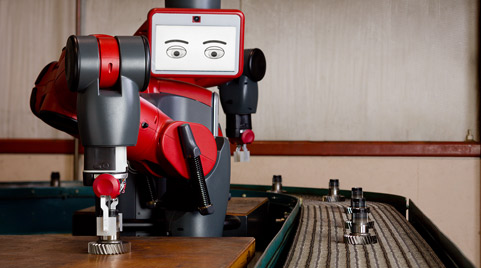This robot could transform manufacturing
September 19, 2012
Baxter, is six feet tall, 300 pounds, and a robot. It could bring automation to new areas of manual work and help many U.S. manufacturers regain a competitive edge, Technology Review reports.
Almost anyone, literally, can in very short order be shown how to program it,” says Chris Budnick, president of Vanguard Plastics. “It’s a matter of a couple of minutes.”
Baxter is the first of a new generation of smarter, more adaptive industrial robots. Conventional industrial robots are expensive to program, incapable of handling even small deviations in their environment, and so dangerous that they have to be physically separated from human workers by cages.
So even as robotics have become commonplace in the automotive and pharmaceutical industries, they remain impractical in many other types of manufacturing.
Baxter, however, can be programmed more easily than a Tivo and can deftly respond to a toppled-over part or shifted table. And it is so safe that Baxter’s developer, Rethink Robotics, which loaned Baxter to Vanguard Plastics, believes it can work seamlessly alongside its human coworkers.
Recovering lost jobs and improving competition
Baxter’s talents could, for the first time, bring the benefits of robotics and automation to areas of work where it never made sense before. This might mean lost jobs for an already struggling low-skill workforce. But it could also help the United States compete in the global manufacturing market against countries that offer low-wage labor.
The International Federation of Robotics estimates that there are now 1.1 million working robots around the world.
Some fear that overcoming those obstacles could cost human jobs. But Rethink Robotics founder and AI expert Rodney Brooks doesn’t agree says Baxter is designed to make human workers more efficient, not to replace them. “An electric drill makes a home contractor more productive,” he says. “Should we ban electric drills so there are more jobs for home contractors? You ask any home contractor that.”
Boosting the efficiency of small manufacturers could help fuel the economy and drive job creation. By shifting the balance away from low-cost human labor, Baxter and similar robots could perhaps also make manufacturers in the United States and Europe more competitive with their counterparts in Asia.
